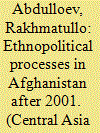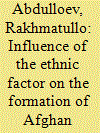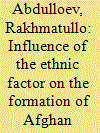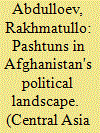| Srl | Item |
| 1 |
ID:
127610


|
|
|
|
|
| Publication |
2013.
|
| Summary/Abstract |
Throughout the 20th century, domestic policy in Afghanistan unfolded under the influence of the ethnic factor. In 1929, the mainly Tajik Habibullah Kalakani movement ended the rule of Amanullah Khan; the National Democratic Party of Afghanistan, which split along ethnic lines, was another factor that brought about his downfall.
In 1992, the mujahideen came to power; this ignited ethnic confrontation and the country's de facto division into ethnically homogenous parts. The Islamist Taliban movement, which relied on the Pashtoon majority, established an unprecedentedly cruel regime and made the country the world center of terrorism and extremism.
In 2001, the International Conference on Afghanistan held in Bonn could not ignore the role of the ethnic factor; it figured prominently while the Constitution was discussed and later adopted, as well as during the parliamentary and presidential elections.
|
|
|
|
|
|
|
|
|
|
|
|
|
|
|
|
| 2 |
ID:
134125


|
|
|
|
|
| Publication |
2014.
|
| Summary/Abstract |
The formation of a unified state in Afghanistan is deeply affected by the many ethnic contradictions that are greatly hindering its current development. They primarily relate to building a multiethnic state, the traditional domination of the Pashtun feudal elite in the power structures, the place and role of the non-Afghan peoples in the country's economic and political life, and the relations among the main ethnic groups that populate the country.
This article examines the sources of these ethnic problems as the centralized state completed its formation in Afghanistan and how they are expressed in the country's current historical mythology.
|
|
|
|
|
|
|
|
|
|
|
|
|
|
|
|
| 3 |
ID:
134124


|
|
|
|
|
| Summary/Abstract |
The formation of a unified state in Afghanistan is deeply affected by the many ethnic contradictions that are greatly hindering its current development. They primarily relate to building a multiethnic state, the traditional domination of the Pashtun feudal elite in the power structures, the place and role of the non-Afghan peoples in the country's economic and political life, and the relations among the main ethnic groups that populate the country.
This article examines the sources of these ethnic problems as the centralized state completed its formation in Afghanistan and how they are expressed in the country's current historical mythology.
|
|
|
|
|
|
|
|
|
|
|
|
|
|
|
|
| 4 |
ID:
127662


|
|
|
|
|
| Publication |
2013.
|
| Summary/Abstract |
For the past fifty years, academics and politicians have been discussing the problem of Pashtun domination in the political life and state structures of Afghanistan. From the very beginning (the Afghan state appeared in 1747), supreme power belonged to members of several Pashtun clans, not counting the two brief periods when ethnic Tajiks filled the highest post: Habibullah Khan Kalakani in 1929 and Burhanuddin Rabbani in 1992-2002.
Until 1973, when Afghanistan ceased to be a monarchy, members of the Pashtun political elite ruled the country as emirs and kings; Pashtuns resided at the very top of the pyramid of power. They owed their exalted position to the prevailing opinion that Pashtuns created the state of Ahmad Shah Durrani.
This is true: the main Pashtun tribal groups and unions set up the Afghan state and remained the pillar of its rulers; their fighting force and military skills were the main factors that added strength to the power of the emir (king) and the key elements of the armed forces of Afghanistan.
|
|
|
|
|
|
|
|
|
|
|
|
|
|
|
|